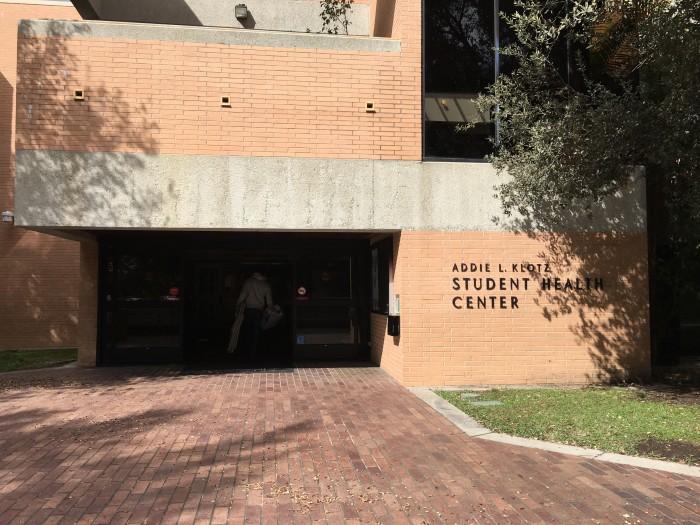Passing out bags of colorfully wrapped condoms and witty notes about pregnancy prevention along the Sierra Quad, 27-year-old first-year master’s student Meagan Robinson tries to reach out to students. Standing by a table filled with information about the services offered by the on-campus Klotz Student Health Center, she waits patiently until she sees an intrigued pedestrian walking her way.
“When I approach students, I think there is a lot of hesitation because they’re trying to go about their days, but a lot end up being pretty intrigued by the information that’s offered,” Robinson said. “I’ve told so many students about it now that I’m interning there and most times I’ll be asked a ton of questions about it afterward.”
Robinson has been working on her social work master’s degree as an intern in the Klotz Center and has been spending some time around campus educating students on the center’s unplanned pregnancy prevention options in addition to various other services offered through the campus.
Although the center is already being utilized by a large number of the CSUN community, it seems that a lot of people still do not know about the extensive list of services available to them at zero to little cost.
“I knew that we had a health center on campus, but I had no idea we had all of these options available to us,” Karen Albright said, 24-year-old marketing major. “I can actually go and see a gynecologist between classes?”
Not only does the center provide family planning and primary care services for men and women, but it also offers appointments for special services like acupuncture, optometry, dermatology and much more.
“I think as students we get so busy taking care of other things, whether it be school, work or things outside of school, that we tend to forget about how important it is to keep our health in check consistently,” Robinson said. “The fact that we have a health center that’s super comprehensive is such a plus while you’re in college. Also, it’s right on campus, which makes it so easy for us to access.”
Klotz Student Health CenterInfographic
Q&A with Meagan Robinson:
Q: How often are you or other representatives for the Klotz Center passing out information?
A: As an intern my main focus is health education, so a lot of my work has been doing clinical health education. This and last semester, I did connect with student organizations like student housing, sororities and Associated Students to set up birth control info sessions. The health education-related subjects are just one part of Klotz though. Staff members of Klotz are always looking for new ways to do outreach so students know about the services at the center.
Q: Where on campus do you normally pass out information?
A: The first time I passed out condoms and info was back in October when we did blindfolded condom races at the Student Housing Halloween event, but I also tabled at student housing recently for their Valentine’s Day event. The most recent passing out of info was on the Sierra Quad and the first two days I tabled on the Greek Quad and the third day will be on Cleary Walk.
Q: How many people on average per day do you speak with about the information provided at the table?
A: If I don’t approach students there seems to be a lot less interest, which could be for a number of different reasons. The average is about 15 or so students who I discuss the info with.
Q: What do you as a student do as part of the center?
A: I’m a student intern at the health center. I’m not paid. I mean I’m kind of paid in experience, which is an invaluable asset in the professional world. My main responsibility is to provide birth control information to students who seek birth control info and other health information. I have a couple other projects that I work on during my down time. One is aimed at educating students about advance directives and the other is a new program that’s being worked on at the health center. The unplanned pregnancy prevention campaign has definitely been an ongoing thing throughout this internship.
Q: Are the services provided really that much more affordable than a regular doctor’s office?
A: Primary care visits are free, which I definitely feel is more affordable than many doctor offices who charge out-of-pocket costs or a co-pay with insurance. If a student has a cold or the flu, they can conveniently swoop over to the health center. Convenience and affordability is so important.












